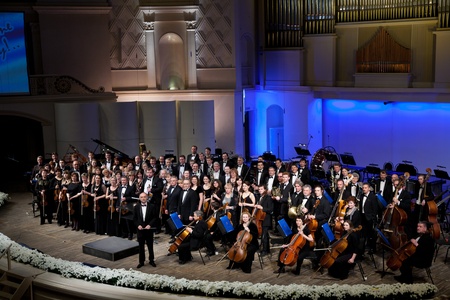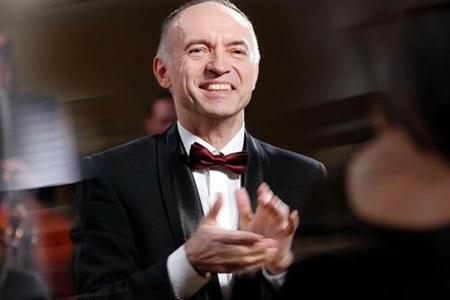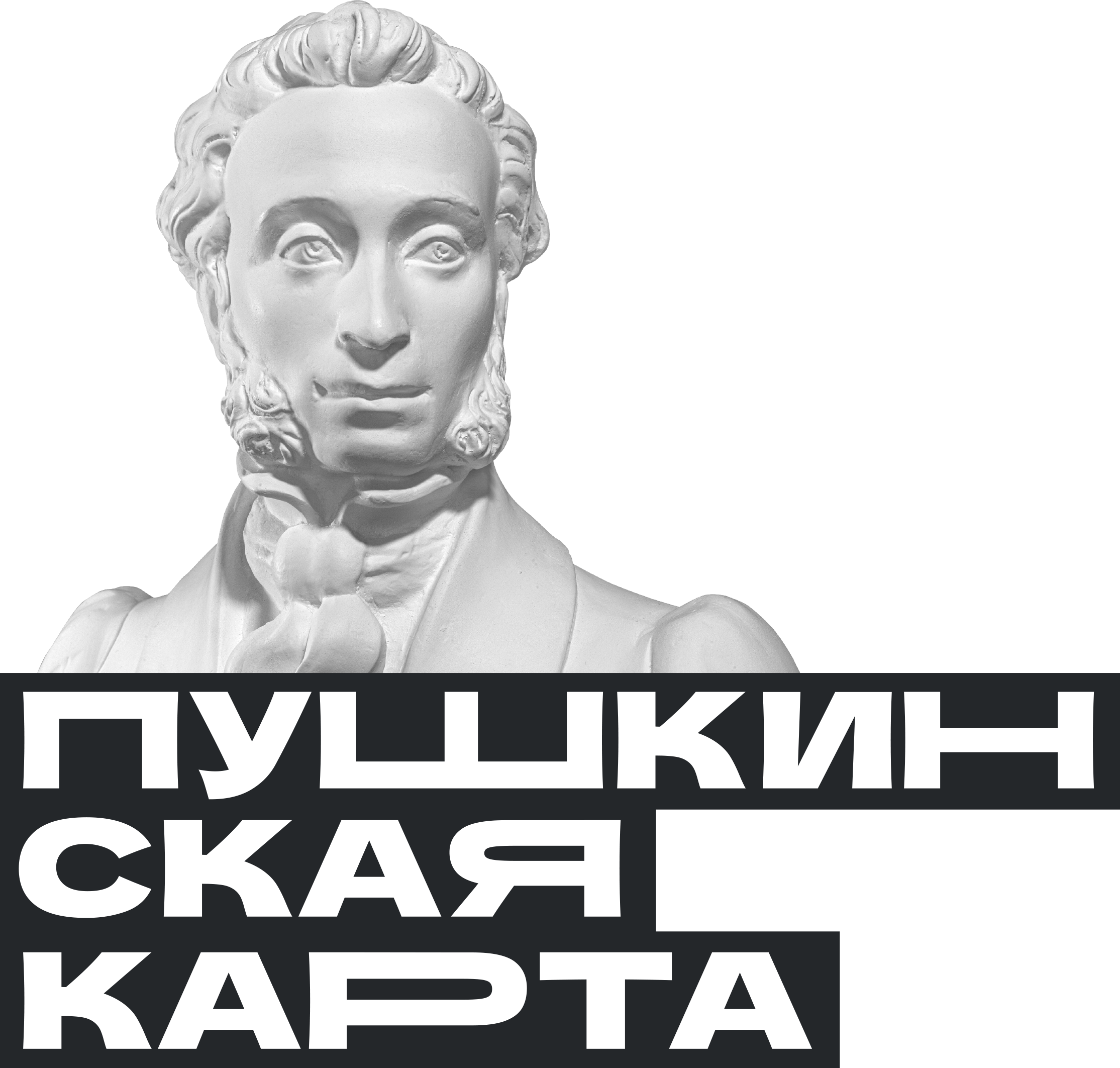Russian State Symphony
Orchestra of Cinematography, Sergey Skripka
October 24, 2018
Tchaikovsky Concert Hall
directions to the hallRussian State Symphony Cinema Orchestra
Sergey Skripka, conductor
Yurlov Russian State Academic Choir

Subscription №27:
Live Music of Cinema
Russian State Symphony Cinema Orchestra
The band traces its history to the times of the "great silent", when in September 1924 the Moscow ARS Cinema on Tverskaya Street replaced their accompanying pianist by an orchestra. As musical accompaniment of films was a success with audiences, the orchestra, led by composer and conductor David Block, soon went on to play in other cinemas as well. Since then, the orchestra has never lost its connection with the film industry. In 1938, the orchestra, which had had no staff musicians until then, got assigned to the Soyuzdetfilm studio of children’s films. In 1943, the Soyuzdetfilm orchestra and choir became an autonomous structure of the national scale.
The orchestra has contributed to the creation of the best of pre-war and wartime films by outstanding directors such as Sergei Eisenstein, Vsevolod Pudovkin, Grigory Alexandrov, Grigory Kozintsev, and Ivan Pyrev. During the war, it was evacuated to Central Asia, continuing to be involved in virtually every Soviet film and frontline chronicle. The year 1944 was marked by two historic events: the orchestra recorded Sergei Prokofiev's music for Sergei Eisenstein's film Ivan the Terrible and gave a concert marking its 20th anniversary at the Column Hall of the House of Unions, which opened with the newly recorded music by Dmitry Shostakovich for Leo Arnstam's film Zoya.
In the post-war decades, the orchestra recorded music for many films, including Grigory Chukhray's Ballad of a Soldier (music by Mikhail Ziv), Sergei Bondarchuk's War and Peace (music by Vyacheslav Ovchinnikov), Operation Y and Shurik's Other Adventures, Kidnapping, Caucasian Style, The Diamond Arm, Twelve Chairs, Ivan Vasilievich Changes Profession by Leonid Gaidai (music by Alexander Zatsepin), The Very Same Munchhausen by Mark Zakharov (music by Alexei Rybnikov), Mary Poppins, Goodbye! by Leonid Kvinikhidze (music by Maxim Dunaevsky), The Meeting Place Cannot Be Changed by Stanislav Govorukhin (music by Yevgeny Gevorgyan), Moscow Does Not Believe In Tears by Vladimir Menshov (music by Sergei Nikitin), The Pokrovsky Gate by Mikhail Kozakov (music by Georgy Garanyan) and many others.
Since 1993, the orchestra has been headed by Sergey Skripka, who has managed to preserve it and sustain its high performing standards. The orchestra’s recent highlights include recording music by Eduard Artemyev, Yuri Krasavin, Artem Vasilyev, Angelo Badalamenti and other composers for films and series such as Sunstroke by Nikita Mikhalkov, The Nutcracker in 3D, The Postman's White Nights by Andrei Konchalovsky, Liquidation, Quiet Flows The Don, and Life and Fate by Sergei Ursuliak, The Brest Fortress and Spitak by Alexander Kott, Dostoevskiy, Demons, and The Parvus Memorandum by Vladimir Khotinenko, Weekend and The End of a Beautiful Epoch by Stanislav Govorukhin, The Spacewalker by Dmitry Kiselev, Legend No. 17 and Flight Crew by Nikolai Lebedev, Stalingrad by Fedor Bondarchuk, The Road to Calvary by Konstantin Khudyakov, The Spirit of Sonora (based on the rock opera The Star and Death of Joaquin Murieta) The Liturgy of the Heathens by Alexei Rybnikov, The Bronze Horseman of Russia by Vasily Livanov, Sobibor by Konstantin Khabensky and many others.
Russia’s best composers have collaborated with the orchestra, including Isaac Dunayevsky, Sergei Prokofiev, Dmitri Shostakovich, Georgy Sviridov, Edison Denisov, Alfred Schnittke, Sofia Gubaidulina, Andrei Petrov, Rodion Shchedrin, Andrei Eshpai, Giya Kancheli, Eduard Artemyev, Gennady Gladkov, Vladimir Dashkevich, Evgeny Doga, and others. In various years, it has performed under the baton of David Block, Alexander Gauk, Vasily Nebolsin, Grigory Gamburg, Nikolai Anosov, Ariy Pazovsky, Nikolai Golovanov, Gennady Rozhdestvensky, Evgeny Svetlanov, Mark Ermler, Gaziz Dugashev, Veronika Dudarova, Yuri Silantyev, Arnold Roitman, Emin Khachaturian, Yuri Nikolaevsky, Vladimir Vasiliev, Martin Nersesian, David Shtilman, Konstantin Krimets, and Nikolai Sokolov. The orchestra’s concerts have featured David Oistrakh, Emil Gilels, Ivan Kozlovsky, Mstislav Rostropovich, Galina Vishnevskaya, Boris Gmyria, Vladimir Krainev, Daniel Shafran, Alexander Slobodianik, Mikhail Pletnev, and Dmitry Hvorostovsky.
The orchestra is highly mobile and flexible, capable of playing in large and small ensembles, transforming into pop and jazz groups, and combining concerts with studio recordings. It regularly participates in the Moscow Philharmonic's subscription programs, the best of which have been Live Screen Music at the Tchaikovsky Concert Hall and Cinema without Borders at the Philharmonia-2. For more than two decades, the orchestra collaborated with the outstanding musicologist and lecturer Svetlana Vinogradova. The musicians have been regular participants of several music festivals including December Nights of Svyatoslav Richter, Music of Friends, Moscow Autumn, Slavic Bazaar, Festival of Russian Culture in India, and major television concert projects, such as Phantom of the Opera on Channel One Russia and The Big Opera on TV Kultura. In 2013, the orchestra received the Russian Government Grant.
Sergey Skripka
Most of Sergey Skripka’s artistic career is associated with the Russian State Symphony Cinema Orchestra. He joined the company in 1977, as a student of Prof. Leo Ginzburg at the Moscow Conservatory, and has been the orchestra’s Artistic Director and Chief Conductor since 1993. Led by Sergey Skripka, the orchestra has recorded soundtracks for most Russian, and also some foreign, films. Over the years, the maestro’s work has been greatly appreciated by his colleagues, becoming an integral part of the national film industry.
The musician has strong artistic links to famous film makers. Outstanding directors Eldar Ryazanov, Nikita Mikhalkov, Sergey Solovyov, Pyotr Todorovsky, famous actors, composers, and screenwriters have repeatedly appeared on stage with the maestro and his orchestra. Film lovers might remember his brilliant programmes celebrating milestone birthdays of Gennady Gladkov, Eduard Artemyev, Alexander Zatsepin, Alexey Rybnikov, Vladimir Dashkevich, Polad Bülbüloğlu, Maxim Dunaevsky as well as commemoration concerts of Tikhon Khrennikov, Andrey Petrov, Isaak Schwartz, Yevgeny Ptichkin, Oscar Feltsman, Mikael Tariverdiev, Nikita Bogoslovsky, Kirill Molchanov, Georgy Garanian, and Rolan Bykov. Since 2006, Sergey Skripka and the Cinema Orchestra have been running Live Screen Music, a unique personal subscription series at the Moscow Philharmonic.
Sergey Skripka has collaborated with many Russian ensembles, touring both in Russia and abroad. He has performed and made records with famous soloists including Mikhail Pletnev, Dmitry Hvorostovsky, Sergey Sudzilovsky, Alexander Vedernikov, Lyubov Kazarnovskaya, Alexey Lubimov, Andrey Diev, Rodion Zamuruev, Alexander Gindin, Alexey Nabiulin, Alena Baeva, Gaik Kazazyan, Nikita Borisoglebsky, and others. Since 1975, he has headed the Zhukovsky Symphony Orchestra. For 27 years, he also was a Professor of Orchestra Conducting Department at the Gnessin Russian Academy of Music.
The conductor’s repertoire includes works of different eras and genres, from baroque to contemporary music, from high classics to best pop pieces. The maestro premiered the oratorio St. Mark Passion by Reinhard Keiser in Russia and made the first CD recordings of some pieces by Reinhold Glière, Alexander Mosolov, Vissarion Shebalin, and Edison Denisov. In 2018, Sergey Skripka conducted the world premiere of the requiem Nine Steps to Transformation by Eduard Artemyev. He regularly serves as a jury member at film festivals and music competitions. He also belongs to NIKA and Golden Eagle film academies as well as the Russian Union of Cinematographers. Sergey Skripka is Merited Artist of the Russian Federation (1993), People’s Artist of the Russian Federation (1998), Honorary Citizen of the city of Zhukovsky (2004), recipient of the Russian Government Prize for Culture (2010) and holder of the Order of Honor (2016).
Yurlov Russian State Academic Choir
The Yurlov Russian State Academic Choir is a world-famous Russian choir, and one of the oldest music ensembles in Moscow.
Although the Choir celebrated the 100th anniversary of its official history in the 2018/19 season, the prehistory of the company dates back to 1900, when the church choir master Ivan Yukhov founded a family singing ensemble in the town of Shchelkovo near Moscow. At the turn of the 19th and 20th centuries, Moscow saw a lot of emerging art associations like Moscow Art Theater or Pyatnitsky Russian Folk Choir. Yukhov’s amateur choir had become widely known long before the 1917 revolution for performing sacred music, folk songs, choral, vocal, and symphonic works by Russian and Western European composers.
After the revolution, the choir was nationalized by the Soviet authorities, and in January 1919 it received the official status of the First State Choir. Apart from touring extensively, the increasingly popular ensemble was also involved in cultural projects of the young Soviet state. In particular, they recorded soundtracks for such famous films as Jolly Fellows, The Circus, We are from Kronstadt, and Volga Volga.
Appointing Alexander Yurlov (1927–1973) to head the company in 1958 was a landmark event in its history. With this outstanding conductor, the Choir ranked among the country’s best musical groups in the 1960s. The company collaborated with the renowned Russian composers Sviridov and Shostakovich and premiered works by Rubin and Shchedrin. Alexander Yurlov deserves credit for reviving the tradition of concert performances of Russian Orthodox church music. Yurlov was succeeded by Yuri Ukhov and Stanislav Gusev, talented musicians, conductors and choirmasters who enhanced the popularity of the Choir.
Since 2004, the Choir has been headed by Gennady Dmitryak, People’s Artist of Russia, professor, one of Russia’s top choral, opera and symphony conductors. A musician of great energy, Gennady Dmitryak meets daunting challenges confidently, while launching unique art projects. With him, the Choir ran Kremlins and Temples of Russia, and Holy Love, festivals reviving the traditions of major vocal and choral educational programs. In the spring of 2014, the company was closely involved in the 22nd Winter Olympic Games and 11th Winter Paralympic Games in Sochi. In the 2018/2019 anniversary season, the Choir held a music festival with concerts in Moscow, Sevastopol, Kurgan, Chelyabinsk, Tyumen, Surgut, Khanty-Mansiysk, as well as in France.
The Choir often tours throughout Russia from Magadan to Kaliningrad. The company led by Gennady Dmitryak has appeared triumphantly in Spain, Greece, Great Britain, the Republic of Belarus, Armenia, Poland, Ukraine, North Korea and in the Baltic countries. The team is a regular guest of leading music festivals. Symphony conductors collaborating with the Choir include Yuri Bashmet, Valery Gergiev, Vladimir Fedoseev, Dmitri Jurowski, Vladimir Jurowski, Mikhail Pletnev, Pavel Kogan, Teodor Currentzis, Sergey Skripka, Alexander Sladkovsky, and Yuri Simonov. The ensemble is widely known for their brilliant interpretations of music by Bortnyansky, Berezovsky, Kastalsky, Grechaninov, Chesnokov, Rachmaninoff, and Sviridov. The Choir’s repertoire includes virtually all of the Russian and Western European cantatas and oratorios, from Bach’s High Mass to works by Britten, Bernstein, Shostakovich, Schnittke, Kancheli and Tavener.
A unique project of the Choir was recording the complete choral works by Sviridov commemorating the 100th anniversary of the composer’s birth. In 2019, the project won the Pure Sound International Award for the best recording of Russian academic music in Choral category.
On May 31, 2019, the Choir was awarded the Commendation of the President of the Russian Federation ‘for merits in developing national culture and art and years of fruitful activities.’
(Press Service of the Choir)





